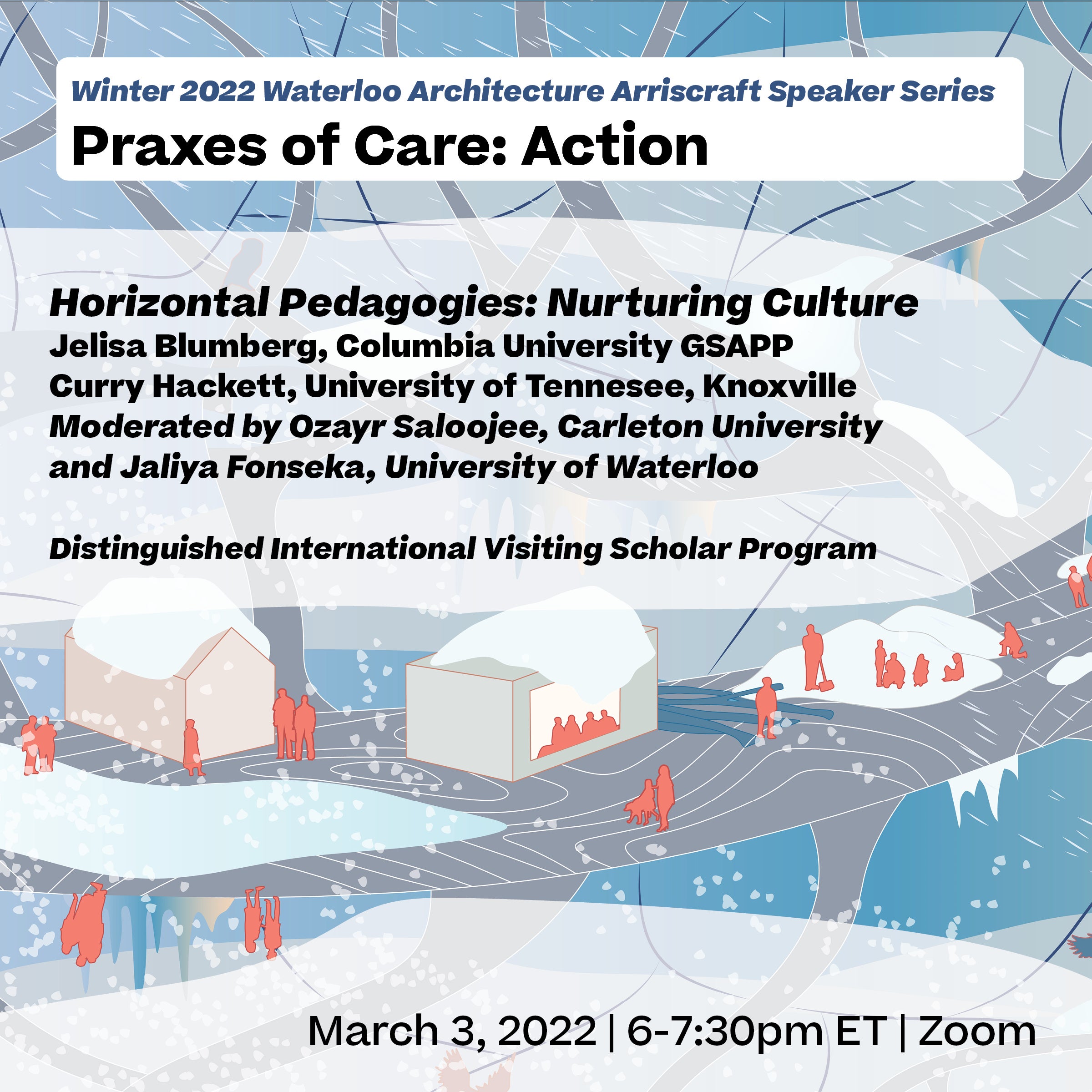
In Honour of Andrew Levitt, celebrating the legacy of a Professor Emeritus dedicated to teaching on care, and with care.
Please join us for Horizontal pedagogies: nurturing culture, the second of five conversations on the theme of action, with speakers Jelisa Blumberg, Columbia University GSAPP, and Curry Hackett, University of Tennessee, Knoxville. Their short presentations will be followed by a discussion moderated by Ozayr Saloojee, Carleton University, and Jaliya Fonseka, University of Waterloo.
Praxes of Care asks, “what is an architecture of care?” Over four terms–Fall 2021 to Winter 2023–a series of conversations will bring together two or more architects, designers, researchers, artists, activists, and care workers to discuss care processes according to the themes of Attention, Action, Communication, and Maintenance. The series is curated by faculty, staff, and representatives of student groups: Treaty Lands Global Stories, Bridge, and the Sustainability Collective. Recent calls for change have shifted the discipline toward the underlying social and ecological processes enabled by the production of architecture. By listening to and learning about care practices from interdisciplinary perspectives, we can begin to reshape the discipline of architecture into a form of care.
WINTER 2022: ACTION
In our ongoing Speaker Series, this semester we investigate action within a praxis of care.
In taking action within care practice, we first take on responsibility. To act in care also requires additional factors that care theorists Joan Tronto and Bernice Fisher identify as time, material resources, knowledge, and skill. We might also add emotional and physical energy to this list. As a praxis, care is the manifestation of theory through embodied practice. We, as architects, are in a powerful position to care for and with people through our practices of placemaking. Architects and designers have an explicit obligation to their publics to take on the responsibility and enactment of care work.
In the action of care, the carer often has power over the cared-for. Care work, therefore, lives within power imbalance. Western technoscience theorists Aryn Martin, Natasha Myers, and Ana Viseu reflect on how critical care practices must be “committed to an intersectional feminism that can grapple with the constellations of power manifest in concatenations of capitalism, colonialism, race, class, ability and gender.” As architects working within a position of power, we must practice care-fully.
SPEAKER BIOS
Jelisa Blumberg is a transdisciplinary designer, with a focus on architecture and lighting design, based in Brooklyn, New York. Blumberg is an adjunct assistant professor at Columbia University’s Graduate School of Architecture, Planning and Preservation and a core member of Dark Matter University. She holds a Masters of Architecture and a Masters of Fine Arts in Lighting Design from The New School, Parsons School of Design, in New York along with a BFA in Design from the University of Texas at Austin. Jelisa has designed the lighting for various cultural projects in New York including a fashion exhibition at the Metropolitan Museum of Art, a leisure club and spa in Soho, a radio station in Chinatown, and an apartment gallery in the Lower East Side. Her emerging practice, Un–Other Practice, looks to transdisciplinary methods of design to enable networks of trust on community-driven projects. Most recently, Jelisa has co-initiated a project in Baltimore, Black Baltimore Digital Database, with artist Derrick Adams. Blumberg serves as the primary investigator for a recently awarded $1.25 million lead grant by the Mellon Foundation to build organizational capacity.
Curry Hackett is a transdisciplinary designer, public artist, and educator. His practice, Wayside, synthesizes cultural and ecological narratives to envision meaningful work in the public realm. Noteworthy projects include the Howard Theatre Walk of Fame, the DC High Water Mark project, and his ongoing research project, Drylongso, which explores relationships between Black material culture and land. Curry began his academic career in 2019 at his alma mater Howard University (Washington, DC) where he studied architecture. He has since taught at Yale University (New Haven, CT) and Carleton University (Ottawa, ON) in partnership with the anti-racist design justice school Dark Matter University.
Ozayr Saloojee is an Associate Professor of Architecture at Carleton University in Ottawa, where he is also cross appointed at the Institute for African Studies, affiliate faculty at Carleton’s Center for the Study of Islam and Chair of the M.Arch Program at the Azrieli School of Architecture and Urbanism. In 2021, he began a three year appointment as Associate Editor of Design for the Journal of Architectural Education. His teaching and creative practice links architecture, landscape architecture, and politically contested terrains. He maintains research interests in the art and architecture of the Islamic world, exploring questions of tradition, modernity and representation. Born rand raised in Johannesburg, South Africa, Ozayr received his B.Arch and Post-Professional M.Arch II (Theory + Culture) from Carleton, and his Ph.D from the Bartlett School of Architecture in UCL.
Accessibility: Waterloo Architecture is committed to achieving accessibility for persons with disabilities who are attending the event. Closed Captioning will be available during the live event. For accommodation questions and requests, please contact us in advance of the event at adudnik@uwaterloo.ca.
For more information on this series and other events presented by Waterloo Architecture, please visit waconnect.ca or follow us @waterloo_architecture.
If you enjoy this lecture series and would like to help the School of Architecture continue to provide similar education activities and engagement opportunities, please visit our support page. Thank you for your dedication to our students and to our School!